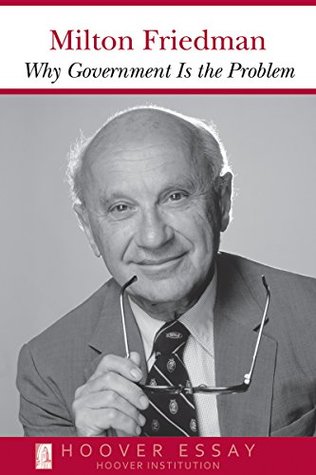More on this book
Community
Kindle Notes & Highlights
You can rigidly enforce only those laws that most people believe to be good laws, that is, laws that proscribe actions that they would avoid even in the absence of laws. When laws render illegal actions that many or most people regard as moral and proper, they can be enforced only by brute force. Speed laws are an obvious example; alcohol prohibition, a more dramatic one.
The basic functions of government are to defend the nation against foreign enemies, to prevent coercion of some individuals by others within the country, to provide a means of deciding on our rules, and to adjudicate disputes.
Government actions often provide substantial benefits to a few while imposing small costs on many. A dramatic example occurred to me recently when I was talking to a taxicab driver in New York City.
The phenomenon of concentrated benefits and dispersed costs is a valid explanation for many governmental programs. However, I believe it does not go far enough to explain the kind of situation in which we now are.
More important, they have a much different and deeper pocket to draw on. With the best intentions in the world, they can try to persuade the people who hold the purse strings to finance the enterprise on a larger scale, to dig deeper into the pockets of the taxpayers to keep the enterprise going. That illustrates a general rule: If a private enterprise is a failure, it closes down—unless it can get a government subsidy to keep it going; if a government enterprise fails, it is expanded. I challenge you to find exceptions.
At Bretton Woods, two agencies were established: one to administer a fixed exchange rate system and the other, the World Bank, to perform the function of promoting development. Now you have two agencies to promote development, both of them, in my opinion, doing far more harm than good.
incidentally, did not prevent the decline of the U.S. auto industry. It is not true for sugar import quotas. If you could have a public vote on whether consumers want to pay twice the world price for sugar, do you think that there would be an overwhelming vote saying
In the 1930s, it went the other way. It is ironic that the Great Depression was produced by government but was blamed on the private enterprise system. The Federal Reserve System explained in its 1933 annual report how much worse things would have been if the Federal Reserve had not behaved so well, yet the Federal Reserve was the chief culprit in making the depression as deep as it was.
"You know we never could have adopted by legislation the rates of tax we now impose on low and middle incomes. When those rates were adopted, they were on high-income people, but inflation made them applicable to low-income people." I believe that was an important effect of inflation on expanding government.
However, it does have some good features. The deficit is the only thing that is keeping spending from going up still faster. Moreover, I do not know of any component of government expenditures that does less harm than the payment of interest. If interest rates tomorrow were zero so that government did not have to pay any interest, what would happen to the money it saved? Do you think it would reduce the deficit? You are kidding yourself.
A book just recently published by the Manhattan Institute is Linda Chavez's excellent Out of the Barrio, which gives another example of how government creates problems, in this case, through bilingualism. She discusses that very effectively, and I recommend her book to all of you.
The great virtue of a free market system is that it does not care what color people are; it does not care what their religion is; it only cares whether they can produce something you want to buy. It is the most effective system we have discovered to enable people who hate one another to deal with one another and help one another.


